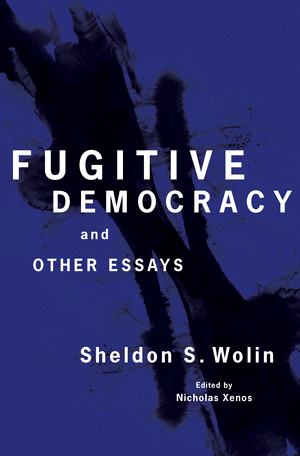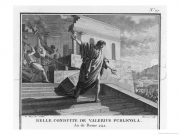When will social distancing end? The unfortunate truth is that we were already socially distant, and we were already suffering for it.
We'll Always Have Sproul Plaza
Sheldon S. Wolin, who died last year, was an immensely influential figure in American political thought. His student, Nicholas Xenos, has edited 25 of Wolin’s essays as a kind of monument to his teacher, the noted democratic theorist, lover of “participatory democracy,” and scourge of all forms of antidemocratic thought. And a fitting monument it is. Fugitive Democracy and Other Essays gradually reveals the whole of Wolin’s thought from bottom to top, from fundamental question to perpetual answer.
That question is what to do about modernity. Like Martin Heidegger and his French followers like Jean-Paul Sartre and Michel Foucault, but above all like Max Weber, Wolin is horrified by the bureaucratic, administrative, technocratic world and its evisceration of politics. His answer is more like Sartre’s “fused group” than Weber’s hope for charismatic leadership or Heidegger’s patient waiting for the gods to return. Like Sartre, Wolin longs for mass action and revolution—but without either the thoroughgoing demonstration of what that means or the ugly reveling in violence that one finds in Sartre.
Like all of them, however, he sees things in terms of a binary opposition and a history. As he sees it, ever since his beloved 5th century Athenian democracy, anti-democrats, from Aristotle to Robert Dahl, have been finding ways to frustrate the genuine expression of popular politics and getting ever better at it. Constitutionalism has always been a means of redirecting and controlling the popular will. But now modernity, using natural science as a means of control, has transformed even liberal constitutionalism into a soulless, mechanical quasi-tyranny.
The essays are intelligently arranged. After an essay-and-a-half of (quite effective) polemicizing against behaviorist political science and postmodern political theory, we get the Wolin democratic creed, mostly as presented in critiques of ancient, anti-democratic Greek thought. There follow assessments of his great modern predecessors, Thomas Hobbes, Karl Marx, and Weber; of contemporaries such as Max Horkheimer, Theodore Adorno, and Hannah Arendt; and of the postmodernists Foucault and Richard Rorty. These get increasingly harsh and prepare the way for the last section, which contains anti-conservative polemics from the 1970s and 1980s. These seem dated, but they do flesh out what Wolin means by democracy.
Like that polite curate’s egg, parts of this are excellent. First, Wolin has a way with a punch line. Some of his formulations are as illuminating as they are epigrammatic: Weber’s inability to develop a grand political theory is “the meaning of social science.” Devastating—as is his account of the “trustee or stewardship notion” of the postmodern Progressives as they patronize the marginalized and oppressed.
In particular, the essays on Marx and Weber are worth thinking about seriously. Wolin argues that the more Marx learned about capitalism the less tenable his theory of proletarian revolution became (though this did not, as Wolin omits to tell us, keep Marx from fantasizing about imminent revolution to the end of his life[1]). Wolin’s Marx thus prepares the way for Weber and for Wolin himself, faced with a perpetual “crisis” of capitalism/technology to which there is no prescribed historical end. The essay on Weber makes interesting reading when compared to the fact/value chapter in Leo Strauss’s Natural Right and History (1953). They both see the deeply theological side of Weber’s contradictions, though Wolin (whose bête noire was Strauss) has no recourse to Strauss’s alternative of “classical rationalism.” Wolin describes the “torment” in which Weber found himself: prophesying a “polar night of icy darkness and hardness” while being unable to combat it by turning science against the theory that brought on that night (since it was science itself that did it), or to find a new ontology with which to redeem the world.
Wolin is also interesting and perceptive on the Frankfurt School, whose “cultural critique” failed both because it had no “total” standard from which to issue that critique, and because it cut its ties with democratic politics and the “masses.” He is good as well on the defects of Foucault, Rorty, and John Rawls. His kinship with Arendt is clear enough, but he dislikes her aristocratic “republican” early phase, finding hope for her in her later, more leftish and anti-Vietnam war years. You don’t have to occupy the same vantage point as Wolin does to register how discerning he is about Rawls’s anti-political dogmatism, Foucault’s curious and dialectical surrender to the mere “power” he critiques, and finally, though it seems a bit over the top to me, the smugness and neo-puritanism of Rorty’s defense of democracy.
As to the Wolinian vantage point, his own answer to the icy night of the techno-state is participatory democracy. Fifth century Athens proves it was once possible. The Free Speech Movement at Berkeley in 1964, and successors, prove that it still is possible. He defends Athens early in the book and upholds those famous, photogenic days in Sproul Plaza as a kind of talisman at its end. In the first instance, he wants democracy to be pure, free of any restraints that might get in the way of the people becoming a community, deliberating with each other and determining, as a collective, the fate of their land. “Constitutional democracy” is for him a clever device of aristocrats, from 4th century Athens down to the Federalist. It is in his words an “ideological construction designed not to realize democracy but to reconstitute it and, as a consequence, repress it.”
The resemblance of this to Weber’s notion of the routinization of charisma, or to Sartre’s loathing of “petrifaction,” is plain enough. Even compromise and negotiation get a bad rap, since (and here Wolin is not just talking about denatured contemporary techno-politics) they are merely the “legislative bureaucratic counterparts to technical knowledge” (emphasis in original). As for liberal rights that stand against the popular will, I see no sign that Wolin has much respect for them. He is for rights, all right, but only if the people see fit to grant them. After all, guaranteeing them constitutionally would seem to commit the mortal sin of repressing democracy. He calls “populism” the “contemporary euphemism” for “bad” democracy. (One wonders on what grounds he would have disapproved of the Trump phenomenon. It’s a virtual certainly he would have found some.)
Wolin sees the obvious problem. Like Sir Terry Pratchett’s Lord Vetinari, who observes that the good people are good at overthrowing tyrants but not much else, including figuring out how to collect the garbage[2], the “fraternity of battle,” as Wolin’s student Wilson Carey McWilliams aptly called it, tends to fall apart when peace comes, business has to be taken care of, and interests reassert themselves. (That bothered Sartre about his “fused group,” too.) Even the Students for a Democratic Society figured that out back in the 1960s, when the SDS organizers began to notice that participatory democracy wasn’t working because only a few paid enough attention to the issues to prepare an agenda for the meetings.[3]
When daily business again rears its ugly head, constitutionalism and compromise might start looking like pretty good alternatives to the tyrants and demagogues, who Wolin admits led that halcyon 5th century Athenian democracy. The admission has its limits; he explains that those were just terms for popular leaders. At one point, Wolin seems to concede that democracy is only a “moment” in that boring world of constitutional, or worse yet, administrative rule. However, he seems to criticize Foucault for accepting that very fact. Perhaps, therefore, one could suggest the other meaning of “moment” as Wolin’s real intention: moment as a physical force directed against the stable order. That would be confirmed by the last essay, which calls for “mass protest” and “agitation,” which, after starting at the local level, he hopes will become a national movement, as in those good old days of SDS.
Here the essential gormlessness of Wolin’s passionate faith begins to become evident. A comparison with Sartre’s “fused group” and “fraternity-terror,” also a product of those heady days half a century ago, is instructive. If you really hate everything, whether liberal-constitutional or “postmodern” technocratic, because these restrain the popular will; and if you love passionate mass revolution more than anything else, well then, explains Sartre, not only will you have to be risking your lives mutually, but you will have to “lynch” (Sartre’s word) anybody who wants to go back from this holy terrorist hell/heaven to normal (alienating) politics.[4]
The vision outlined here, to the extent that it has any clear form, is much tamer. It seems, as Wolin’s autobiographical reminiscences indicate, rooted in the demonstrations that took place in 1964 on a college campus in California: the aforementioned events at Berkeley’s Sproul Plaza. The trouble is that, far from being genuinely revolutionary, the New Left in America was engaged in pseudo-revolutionary theater which precisely the solidity of the constitutional order made such fun and so harmless. Harmless, above all, to the “revolutionaries” themselves, who were constantly demanding, and getting, “amnesty” from the deans for participating in their “revolutionary” activity.
If Wolin were serious about revolution, he would, like Sartre, have to either affirm or find some way to dispel the horrors that Machiavellian considerations of power always thrust on the fighters, no matter how idealistic or justly enraged they start out as. Still, not being clear or serious about revolution means that Wolin can get away with sneering at conservatives (or liberals) who fear it, and dismissing the parallels with mass movements of the Right with superficial distinctions. (Good democrats don’t get off on uniforms and marching in step. So there.) In the end, therefore, almost like teenagers or college students whose rebellion presupposes the security of the parental order, Wolin’s fire-breathing “democracy” of mass-protests and agitation collapses as soon as it, horribile dictu, wins. Then, assuming that constitutionalism and compromise don’t rear their hideous, boring, and undemocratic heads, nothing will be left for it but Machiavellian organization for utopian (allegedly “democratic”) ends—nothing, that is, but a Stalin or a Mao.
The early essays on the Greeks show what, at bottom, is wrong here. While Wolin reads philosophers he is sympathetic to (and even Hobbes, to whom he isn’t) with care and intelligence, he makes no such effort with the ancients. He cherry-picks and condescends. Thus he fatuously asserts that Thucydides didn’t understand what he recounts in the Mytilenean debate. Thucydides, Wolin thinks, unwittingly gives Cleon some good arguments in favor of democracy. Missing here is the fairly obvious point that those arguments help Cleon pose as a Periclean Dutch uncle, when in fact his real strategy is to terrify and demoralize the people so they will trust only him. In other words, Wolin is overly impressed with the sheep’s clothing.
Similarly, he thinks that Diodotus says things in opposition to Cleon that actually show the strength of democracy. That they show the strength of a certain kind of democracy—a self-limiting kind, and one that by necessity isn’t wholly democratic—is something which, again, Wolin doesn’t seem to notice. Perhaps if he didn’t simply label Thucydides an anti-democrat, he might have begun to look more deeply into what Thucydides actually thought about democracy.
Moreover, where Thucydides carefully shows the reader that Athenian imperialism abroad was a needed concomitant to radical democracy at home, and that this, in turn, presented a fatal contradiction for both the empire and the democracy, Wolin sees no connection whatever and thinks it sufficient to disown the imperialist project while supporting democracy. In fact, as it was for Livy’s and Machiavelli’s republican Rome, the common enterprise of plundering others was for Athens, as the Funeral Oration strongly suggests, the price of internal comity.
There is a reason Wolin has such a tin ear when it comes to the ancients, I suspect. He begins by being sniffy about Pericles, whom he wrongly thinks Thucydides wholly admires, because he, Wolin, is unhappy with the notion that the people need to be led wisely. Thucydides’ picture of Pericles as a de facto monarch who kept the people from doing dumb stuff is one Wolin passionately and dogmatically rejects, even though he admits (see above) that tyrants and demagogues tended to lead Athens during its heyday. Thus one of Thucydides’ most useful and profound political themes, namely the character of good leadership in a democracy, is a closed book to Wolin.
What SDS itself came to discover—the need for democratic leadership, though its members never learned much about how to exercise it—is something Wolin seems never to have wanted to discover. Apparently, that way lie not only the horrors of constitutionalism but ultimately the Brave New World. Indeed, such set-pieces as the Mytilenean and the Melian debates could have given Wolin a much more effective defense of participatory democracy than the bare negation of the techno-state he made his standard.
Had he taken the Greek thinkers not as simple enemies of democracy but as possible sources of understanding, and even maybe as democracy’s friends (of a kind), the legacy of Sheldon Wolin might have been more enduring than I suspect it will be, or at least ought to be. It could be leadership and the rechanneling of popular zeal don’t have to eventuate in the techno-state. Maybe, as Diodotus indicates, a real and genuinely participatory democracy would in fact benefit from some checks, whether the liberal-institutional ones, or the subtler ones devised by wise democratic statesmen. Maybe, in fact, thinking things through in moderate, less utopian ways is a much better way of holding the line. “Constitutionalism” as only a step toward techno-hell seems to me ultimately a counsel of despair, and Wolin’s dream of revolutionary democracy an expression of the false resolve of the despairing.
Finally, in view of recent events, it seems to me that the heritage of the New Left, which Wolin in effect theorized, has become lethal to itself as well as to the country. Now that theatricality has finally, and potentially dangerously, become the language of the Right, one would hope that the Left would begin to get a grip. It’s not the nice, parental Bush-and-Romney time anymore. If the alt-Right really is a danger, we need a sober Left to fight it, not people who, in a dreadful but not utterly implausible parody of Berkeley in 1964, hold “cry-ins” to respond to perceived evil. Raging at constitutional liberals is, I fear, a luxury that anyone who wants to avoid the hideous choice between tyrannical demagogues and the techno-state can no longer afford. We’re in this together and we need to focus.
[1] This Marx did in a letter to the editor of the literary journal Otechestvenniye Zapisky (“Annals of the Fatherland”), November 1877, available at http://www.marxists.org/archive/marx/works/1877/11/russia.htm. See also Isaac Deutscher’s BBC lecture from 1948, https://www.marxists.org/archive/deutscher/1948/marx-russia.htm.
[2] Terry Pratchett, Guards! Guards! (Harper-Collins, 1989), pp. 383-384.
[3] “The primary contradiction in SDS involves the conflict between the notion of participatory democracy as a vision of the good society and its ineffectiveness as a style and structure for serious radical work.” Greg Calvert, “Participatory Democracy, Collective Leadership and Political Responsibility,” in New Left Notes, Volume 2, No. 45 (Madison, Wisconsin, December 18, 1967), p. 1. Cited in Fred Baumann, Fraternity and Politics: Choosing One’s Brothers (Praeger Publishers, 1998), p. 38.
[4] Jean-Paul Sartre, Critique of Dialectical Reason, I, Theory of Practical Ensembles, translated by Allan Sheridan-Smith, edited by Jonathan Rée (Verso, 1982), pp. 429-439.



